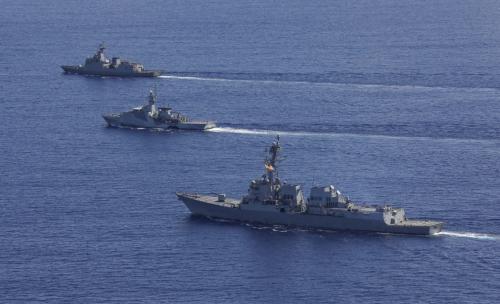On May 30, China launched the International Organization for Mediation (IOMed), a new international organization focused on dispute mediation. Beijing has been quietly working on IOMed since 2022, culminating in a signing ceremony in Hong Kong last week. According to the Chinese Foreign Ministry, 85 countries from Asia, Africa, Latin America, and Europe and around 20 international organizations were present at the ceremony, at which Chinese Foreign Minister Wang Yi delivered the keynote, including 33 countries that signed the convention as founding members.
Given that this is a new international organization led by China, it is important to understand IOMed’s nature, goals, scope of work, and the challenges ahead of it. An examination of the Chinese narratives, analysis, and reports on IOMed reveals a picture that is rather different from the traditional conflict mediation organizations that have been created by state actors such as Norway, Qatar, and Switzerland, or nonstate actors such as the Geneva-based Humanitarian Dialogues in terms of roles, coverage, and its operating model.
The nature of IOMed
According to official Chinese media, IOMed is defined as a formal intergovernmental international organization that is dedicated to a legal, voluntary, and nonbinding process of mediating international disputes that are political and economic in nature. Armed conflicts are not excluded but have not been highlighted as a key area of the organization’s focus.
The concept of IOMed originated from the dispute around the Grand Ethiopian Renaissance Dam on the Blue Nile among Ethiopia, Sudan, and Egypt. Since the dam’s water reservoir has a direct impact on the downstream water available to Sudan and Egypt, Ethiopia’s decision to begin conserving water in 2020 led to a major dispute among the three parties. China was inevitably involved in the dispute, not only because it partially funded and built the dam, but also because China designed and operates the power grid the dam is linked to. In 2021, China began capitalizing on the opportunity to mediate the disputes among the three countries, which eventually led to the idea of IOMed. The plan to found IOMed was announced on October 21, 2022.
Known founding members of IOMed are China-friendly developing countries from Asia, Africa, and Eastern Europe, including China, Indonesia, Pakistan, Laos, Cambodia, Serbia, Belarus, Sudan, Algeria, and Djibouti. These are the 10 countries that signed onto the “Joint Statement on the Establishment of International Organization for Mediation” on October 27, 2022. The West’s exclusion is visible. IOMed is committed to adhering to the U.N. Charter, although the U.N. does not appear to have played a major role in the creation of the organization itself. Chinese narratives on the justification for founding IOMed emphasized the lack of “proportional and fair” representation for the Global South in the international legal systems, including international courts and arbitration systems. IOMed is clearly designed to be an instrument Beijing would like to use to correct what it perceives as an imbalance and to function as “developing countries’” platform to address international disputes.
“An Intergovernmental Legal Organization”
Sun Jin, the deputy director-general of the Department of Treaty and Law of the Chinese Ministry of Foreign Affairs, has been overseeing the creation of IOMed since 2022. Sun, who holds a Ph.D. in international law, authored a paper in 2023 on IOMed’s initiation, which stated that IOMed is “the first intergovernmental legal organization on dispute settlement through mediation.” He described IOMed as “a healthy supplement to the existing dispute settlement institutions and approaches” and “an effort to improve the international system centered on UN and the international order based on the international law.”
As such, IOMed is not a state mediation actor, but a multilateral institution likened to the International Court of Justice and International Court of Arbitration. It is headquartered in Hong Kong and staffed by professional mediators with international law backgrounds and legal training. Mediation by IOMed is voluntary and based on the consent from the parties involved, and its result is nonbinding.
The exact rules of mediation have not yet been made public. However, according to meetings Sun had with trade arbitration courts and law firms, IOMed heavily leans on existing international legal organizations’ dispute settlement frameworks. These include the United Nations Model Rules for the Conciliation of Disputes between States, Mediation Rules by The International Centre for Settlement of Investment Disputes (ICSID), the Mediation Model and Rules of the United Nations Commission on International Trade Law, and the Singapore Convention on Mediation. This alludes to IOMed’s design as an intergovernmental organization following similar international legal organizations in its operation.
In his paper, Sun recognizes the enforcement of the mediated result as a major challenge and that IOMed is unlikely to define any enforcement mechanisms in the near term. China’s assumption is that a resolution agreement reached by the involved parties through mediation will naturally be followed by these parties. However, there is a recognition that such an agreement cannot be binding given the politically tricky issues of sovereignty, jurisdiction, and internal affairs. Sun also recognized that the enforcement of the mediated result on investment and commercial disputes is poorly defined and non-binding. ICSID recommends “most serious considerations of the recommendations by the mediators,” but does not make it binding. The Singapore Convention on Mediation allows signatories to exclude themselves from the convention’s application in specific cases. After all, mediation is not litigation or arbitration.
Disputes rather than conflicts
According to Sun, IOMed covers three types of cases: interstate disputes, international investment disputes, and international commercial disputes. The thinking behind them is highly similar to international arbitration, with the distinct difference that arbitration can be imposed, and its result is binding.
Under interstate disputes, China has cited examples including the Indus Waters Treaty mediated by the World Bank, the Camp David Accords mediated by the United States, and various mediations over maritime disputes, such as disputes over continental shelves. China has not listed interstate or intra-state military conflicts as prime examples or priorities for IOMed, as conflicts tend to pertain to military operations while disputes lie in the political and diplomatic realm. In particular, Sun emphasized IOMed’s legal angle in his paper: “Mediation by IOMed is especially desirable and necessary when the dispute at hand involves legal issues.”
It is notable that intra-state conflicts, civil wars, and local insurgencies are not included in the scope of IOMed’s work at this stage. Given China’s sensitivity to the nature of sovereignty and domestic governance, it is unlikely to extend IOMed’s scope of work to cover internal state conflicts or try to stretch IOMed’s mandate to cover issues such as the Responsibility to Protect in the foreseeable future.
China’s decision to design IOMed on interstate disputes is heavily influenced by its own experience with the Philippines’ 2016 arbitration case against China over the South China Sea. The international arbitration under the United Nations Convention on the Law of the Sea registered with the Permanent Court of Arbitration made rulings against Chinese claims, despite China’s rejection of the process’ legality. Thus, in IOMed’s design, China has stressed that the mediation must be voluntary, based on the consent of all parties involved, and its result nonbinding, instead of “an imposed enforcement of the result, which only escalates the disputes.”
In all areas, IOMed’s primary focus is on economics, particularly investment and commercial disputes. While arbitration is recognized as the primary method of resolving international investment disputes, it is criticized for being unfair and heavily influenced by the West against developing countries. This is deeply relevant for China, given that China has needed a neutral third party to mediate disputes related to its investments in developing countries and debt sustainability challenges under the Belt and Road Initiative (BRI).
Mediation in international commercial disputes is seen as more common, ranging across manufacturing, mining, construction, intellectual property rights, insurance, and reinsurance industries. There are also more organizations and international institutions providing such mediation services, including the Arbitration Institute of the Stockholm Chamber of Commerce, the London Court of International Arbitration, the China International Economic and Trade Arbitration Commission, and the Beijing Arbitration Commission. IOMed’s establishment will compete with these existing institutions, but China believes that there is a major space for IOMed to grow into, especially given China’s growing involvement in international commercial disputes and Hong Kong’s special background and status.
Why Hong Kong?
The selection of Hong Kong as IOMed’s headquarters is deliberate. According to Chinese interlocutors, Hong Kong is an English-Chinese bilingual jurisdiction that connects the Common Law system, which the U.K. and the United States observe, and the Civil Law system, which China, Japan, and Germany follow. Hong Kong’s legal system is deeply rooted in the Common Law system but is connected to the Civil Law system through its linkage to China. Hong Kong’s legal service industry has featured both local and foreign lawyers and even foreign judges in its Court of Final Appeal. The Chinese believe that Hong Kong’s distinct legal background and deep connection to both legal systems offer fertile experience and assets in international arbitration, rich expertise in different legal systems, and bilingual legal professionals. This appears to imply that IOMed’s staff will be global, although the percentage of local Hong Kong residents, and thus staff members from China, will be higher.
In the Chinese design, basing IOMed in Hong Kong will also help push the city’s evolution from the “international financial center” it used to be to an “international legal service center” in the future. In an era when the rule of law in Hong Kong is perceived to be in decline, China hopes IOMed will boost Hong Kong’s reputation and image as well as the credibility of China’s governance of the city.
However, basing IOMed in Hong Kong for its unique legal expertise inevitably reduces the organization’s ability to mediate political disputes, as Hong Kong has little political or diplomatic capital, which is essential to the mediation of intra-state disputes.
China’s goals
China’s goals with IOMed are multifaceted but primarily focused on reforming global governance and addressing international economic disputes. The establishment of IOMed was fostered and led by China, which, in Chinese eyes, asserts and signifies China’s leadership efforts to increase the Global South’s voice in the international legal domain. There is a genuine desire to develop mechanisms to resolve international investment and commercial disputes across different legal systems, which is a growing need due to China’s BRI. This comes in addition to Beijing’s goal of boosting Hong Kong’s international standing and development.
As an international organization, IOMed is unlikely to replace many of the existing international institutions in the short term. Its capability and effectiveness, especially in mediating non-commercial disputes, could take years to develop. IOMed will need a number of high-profile victories to demonstrate its worth, but there is no guarantee that other countries will see IOMed as fair, just, and impartial, particularly given China’s rejection of the ruling in the South China Sea arbitration case. A result that is perceived as biased will harm the organization’s credibility, and given its non-binding nature, actors may simply reject its decision. Thus, it will take time and cases to demonstrate where on the spectrum IMOed will land. Nevertheless, the Chinese seem to believe the old saying, “If you build it, they will come.” If IOMed does prove to be effective in mediating international political and economic disputes through its unique location and legal foundation, it will be a serious competitor to the existing international dispute settlement mechanisms. But the jury is still out.
The Brookings Institution is committed to quality, independence, and impact.
We are supported by a diverse array of funders. In line with our values and policies, each Brookings publication represents the sole views of its author(s).







Commentary
The purpose and promise of China’s International Organization for Mediation
If IOMed proves to be effective, it will be a serious competitor to the existing international dispute settlement mechanisms.
June 6, 2025